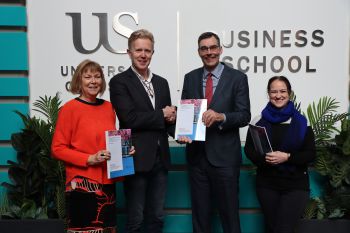New report: The impact of Carbon Literacy training on Professional Services teams
By: Jessica Kistnasamy
Last updated: Thursday, 2 May 2024

L-R: Merrill Jones, Dr René Moolenaar, Prof Steven McGuire, Caroline Barrow
In 2023, Professional Services staff at the Business School went through a modular Carbon Literary course, certified by the PRME Carbon Literacy Project. The impact this training has had on staff at the School, who have committed to reduce their carbon footprint both at home and at work on an annual basis, has been summarised in the report 'Professional Services at the forefront of carbon reduction'.
Carbon Literacy® is relevant climate change learning that catalyses action to reduce greenhouse gas emissions. Whilst many academics and professional services staff from around the world have attended the online PRME Carbon Literacy Training, the authors of the report believe that the agency effect to facilitate discussion and action planning is often undervalued.
Dr René Moolenaar, Dr Murtaza Faruquee, and Ms Alex Pearson MBE created a bespoke version of the training programme consisting of an introductory session, followed by four workshops, from March - June 2023.
Dr René Moolenaar commented: “Most often training courses are run to advance knowledge. However, when the participants are already well versed on the topic, then the course acting as an agent to facilitate discussion about the sources of carbon emissions in a safe environment and collaboratively developing an action plan, is an important course objective to consider from the outset.”
The course, through its guided activities, achieved three key objectives:
- It allowed participants to focus on the problem;
- Created a safe environment for discussion and identification of areas within the work environment with high levels of CO2 emissions, and;
- Facilitated the collaborative development of potential solutions to minimise those emissions.
As a result of the training, recommendations have been made to reduce carbon emissions within a Business School Professional Services domain. These include:
- Turning off monitors and computers at the end of the working day (the standby mode still requires electricity)
- Proactive communication to students to reduce the volume of emails with often similar questions
- Periodic digital decluttering, deleting duplicate, out-of-date or unused files on online storage facilities such as Box and One Drive
- Adding carbon literacy training to the induction programme for new staff.
The Business School has expanded its efforts beyond staff training, now providing carbon literacy training to students through a series of engaging Climate Fresk workshops. These interactive sessions are designed to enhance participants’ understanding of climate change and empower them to take meaningful action.
Our commitment to climate education is further exemplified by the Business School’s pioneering role as the first UK institution to join the TASK™ (The Assessment of Sustainability Knowledge) Change Leaders program. This initiative aims to mainstream sustainability literacy worldwide.
The Business School plays a pivotal role in advancing sustainability research, education, and practical solutions. Through collaboration, innovation, and a commitment to the SDGs, we will continue to contribute to a more resilient and equitable future.

